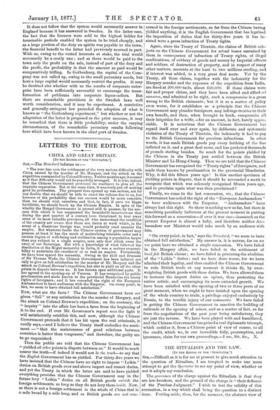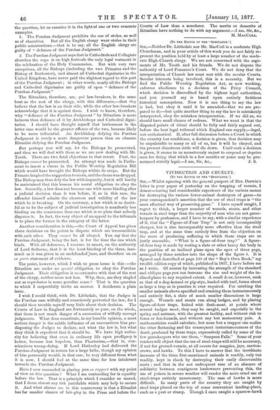THE RITUALISTS AND THE LAW.
(TO THE EDITOR OF THE "SPECTATOR"]
SIR,—Difficult as it is for we at present to give much attention to the question of Ritualism, I am tempted to make one more attempt to get the Spectator to see my point of view, whether or not it adopts my conclusion.
The gravamen of the charge against the Ritualists is that they are law-breakers, and the ground of the charge is " their defiance of the Parches Judgment." I wish to test the validity of this accusation, in a way which shall bring the question to a distinct issue. Putting aside, then, for the moment, the abstract view of
the question, let us examine it in the light of one or two concrete examples.
1. The Purchas Judgment prohibits the use of stoles, as well as of chasubles. But all the English clergy wear stoles in their public ministrations,—that is to say, all the English clergy are guilty of " defiance of the Purchas Judgment."
2. The Purchas Judgment says that in Cathedrals and Collegiate churches the cope is on high festivals the only legal vestment in the celebration of the Holy Communion. But with very rare exceptions, all the Bishops (including the two Primates and the Bishop of Rochester), and almost all Cathedral dignitaries in the United Kingdom, have never paid the slightest regard to this part of the Purchas Judgment ; in other words, nearly all the Bishops and Cathedral dignitaries are guilty of open " defiance of the Purchas Judgment."
The Ritualists, therefore, are, qua law-breakers, in the same boat as the rest of the clergy, with this difference,—that they believe that the law is on their side, while the other law-breakers acknowledge that it is against them. I wish to know, therefore, why " defiance of the Purchas Judgment " by Ritualists is more heinous than defiance of it by Archbishops and Cathedral digni- taries. I should have thought myself that lawlessness in the latter case would be the greater offence of the two, because likely to be more influential. An Archbishop defying the Purchas Judgment is surely a more dangerous person than an obscure Ritualist defying the Purchas Judgment.
But perhaps you will say, let the Bishops be prosecuted, and then we will deal with them as we are now dealing with Mr. Tooth. There are two fatal objections to that retort. First, the Bishops cannot be prosecuted. An attempt was made in Parlia- ment to insert a clause in the Public Worship Regulation Bill which would have brought the Bishops within its scope. But the Primate laughed the suggestion to scorn, and the clause was dropped. The Bishop may thus defy the law with impunity, but it will hardly be maintained that this lessens his moral obligation to obey the law. Secondly, a law does not become one whit more binding after a judicial decision than it was before, if, as in this case, the offender himself admits the clearness and validity of the law which he is breaking. On the contrary, a law which is so doubt- ful as to be the subject of judicial investigation is manifestly less binding on the conscience than one which is so plain that nobody disputes it. In fact, the very object of an appeal to the tribunals is to place the former in the category of the latter.
Another consideration is this,—the Court of Appeal has given three decisions on the points in dispute which are irreconcilable with each other. They cannot be all obeyed. You say that the Purchas Judgment, being the last, is for the time the one which binds. With all deference, I venture to assert, on the authority of Lord Selborne, that it is the least binding of the three, inas- much as it was given in an undefended :case, and therefore on an ex parte statement of evidence.
The point, however, which I wish to press home is this :—the Ritualists are under no special obligation to obey the Purchas Judgment. Their obligation is co-extensive with that of the rest of the clergy, neither more nor less. Why, then, are they singled out as reprobates in some peculiar sense ? That is the question to which I respectfully invite an answer. I desiderate a plain issue.
I wish I could think, with Dr. Littledale, that the Judges in the Purchas case wilfully and consciously perverted the law, for I should then trouble myself very little about their decision. The Courts of Law in England are fortunately so pure, on the whole, that there is not much danger of a succession of wilfully corrupt judgments. What does constitute, in my humble opinion, a most serious danger is the subtle influence of an unconscious bias pre- disposing the Judges to declare, not what the law is, but what they think it expedient that it should be. We have high autho- rity for believing that even in ordinary life open profligacy is better, because less hopeless, than Pharisaism,—that is, con- scientious wrong-doing. If Lord Hatherley had delivered the Purchas Judgment in return for a large bribe, though my opinion of him personally would, in that case, be very different from what it is now, I should feel at the same time far less intolerant towards the Purchas Judgment.
Have I now succeeded in placing you en rapport with my point of view on this question ? What I am contending for is equality before the law. That is a principle which I consider so sacred, that I deem almost any risk justifiable which may help to secure it. And what alarms me in this controversy is that a Ritualist has far smaller chance of fair-play in the Press and before the
Courts of Law than a murderer. The merits or demerits of Ritualism have nothing to do with my argument.—I am, Sir, &c., M. MAcCom.







































 Previous page
Previous page